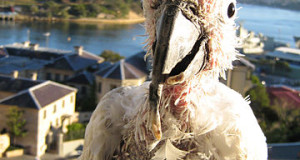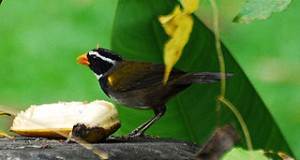
Most parrot owners firmly believe that their pets understand at least some of what they say. My own experience also indicates that this is true – there are just far too many examples of parrots’ utterances fitting the situation to be mere coincidence. Then, of course, there was the famous Alex, an African Grey Parrot whose amazing learning abilities shocked even seasoned animal behaviorists (please see article below). A recent study took an interesting new approach to analyzing parrot speech, and yielded some surprising findings.
A Unique Look at Parrot Speech
Most folks have utilized “question-answer” type research in order to determine if parrots actually respond with correct answers, indicating that they understand the question posed. However, researchers at the University of Georgia (USA) were interested in parrots’ spontaneous vocalizations. They wanted to see if parrots might change what they said to fit different situations, without being prompted by people.
The study’s results, published in the May, 2011 issue of The Journal of Comparative Psychology, established that the utterances of one African Gray Parrot were not random. The bird, known as Cosmo, altered what he said according to what people were present, where they were and what they were doing.
Parrot Changes Words to Fit Situation
If Cosmo’s owner was in another room, Cosmo spoke twice as many words as when the owner was in the same room as himself, or was not present in the house. Amazingly, when the owner was in another room, Cosmo’s words very frequently related to location – “I’m here”, “Where are you?” and so on. The researchers thought this might be an extension of the natural “contact calls” made by parrots in the wild. Flocks and pairs of parrots (and other birds) issue contact calls in order to “stay in touch”, remain aware of each others’ location and pass along information concerning food, safety and other matters.
When owner and Cosmo were in the same room, most of his words were designed to elicit interaction – i.e. “I want to play”, rather than to establish location.
 The researchers concluded that Cosmo was choosing specific words to fit different situations, and had grasped the concepts behind the words he used. Cosmo’s behavior was more clearly understood by viewing “communication units” rather specific individual words. All told, Cosmo used 278 distinct communication units.
The researchers concluded that Cosmo was choosing specific words to fit different situations, and had grasped the concepts behind the words he used. Cosmo’s behavior was more clearly understood by viewing “communication units” rather specific individual words. All told, Cosmo used 278 distinct communication units.
Further Reading
Alex, an African Grey Parrot, and the Concept of “Zero”
Video: Parrot Playing “Telephone”
Both African Grey Parrot images referenced from wikipedia and originally posted by Papooga
 That Bird Blog – Bird Care and History for Pet Birds
That Bird Blog – Bird Care and History for Pet Birds




Our African Grey definitely knows when to use certain phrases. When people are leaving he always says “Bye, see you later” or “see you tomorrow”. Sometimes, if he thinks they’ve stayed too long, he starts saying either of those phrases before they leave.
In the morning, he wishes all who will listen, “Good Morning”, and at night, when he thinks it’s time to go to bed he repeatedly says, “good night” until he gets covered.
When our dog barks or gets noisy, he says “sh-h-h, no barking”.
He says many more things that indicate a complete knowledge of when to use his phrases.
Thanks very much. Linda! Enjoy, Frank
Hi, I have 10 parrots, having become involved at one point in avian rescue and can say without reservation that my birds communicte, especially the greys and amazons. My female grey says no when I tell her to step up if she does not want to and she asks my husband ‘how are you?’ Every day when he comes home. Never me. She has said ‘help me’ when I have pushed her to go further when training and she feels stressed, or if I go to assist her and she feels threatened. If I cry, or she senses that I may, she cries, she also begins crying if she gets upset. She laughs at funny things, watching tv. My yellow naped amazon is also very vocal. He also applies his phrases to apprpriate situations. They both sense wnen you are changing clothes to leave and tell you bye bye. There is so much. I just have no doubt. I had a little green cheek conure who i lost, still heart breaking, that asked me for a kiss every time I walked up to his cage. These creatures complete our home.
Hello Jan,
Thanks for the interesting post!…yes, more and more evidence that some learn to associate sounds, activities etc with appropriate words. Enjoy, frank
Our African gray, Toto sure knows what he is saying. He asks only in the morning, “did you sleepy good?” And he wants to know if you want some coffee. He says he will watch the boat when we leave and tells us he watched the boat when we return. If he hears crying, he says, “I love you.” He always talks more when we are in the other room and has this whistle we give each other that he repeats every once in a while if you don’t answer him. when he throws his food and you come to take his bowl away from him he says, “don’t throw your food.” we love him!.